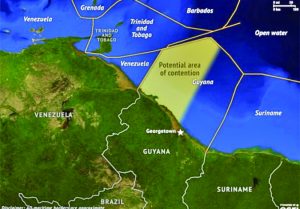Venezuelan border controversy
The Government of Guyana has rejected recent reports emanating from the neighbouring Bolivarian Republic of Venezuela regarding a resolution presented in that country’s National Assembly, calling on Guyana to immediately cease its oil exploration activities in the Stabroek Block, because those activities violate the Geneva Agreement that exists between the two countries.
A statement from the Ministry of the Presidency (MotP) has noted that while the Government of Venezuela has apparently not adopted or otherwise endorsed this resolution, Guyana will not entertain this request, and would, at an appropriate forum, respond appropriately.
“Guyana remains committed to friendly and neighbourly relations with the Government and people of Venezuela, but it will categorically refuse to surrender any of the sovereign rights to which it is entitled under international law, not least in this, the fifty-first anniversary of its independence from colonial rule; as a new period of prosperity awaits its people,” the statement detailed.
The Guyana Government is of the view that the resolution seeks to have it suspend the exploration activities it has licensed and authorised in the Stabroek concession block, which is within its maritime Exclusive Economic Zone and is being carried out in accordance with international law.
The MotP statement also detailed that the inflammatory Venezuelan resolution contains serious “factual and legal errors,” such as suggesting erroneously that the offshore activities ongoing in Guyanese waters have “recently” commenced, whereas the Stabroek licence was awarded in 1999 and exploration commenced the following year, in 2000, some 17 years ago.
The MotP statement says the resolution is also erroneously suggesting that Guyana is prohibited from developing its resources in this area because of Article V of the Geneva Agreement of 1966, but nothing whatsoever in the terms of that provision indicate that either party cannot exercise jurisdiction over its sovereign territory.
“Otherwise, it would mean that, for the past fifty years, Guyana had no right to develop 70% of its territory; and the same applies to Venezuela’s development of the Orinoco region and adjacent maritime area, which, like the Essequibo, was the subject of the 1899 Arbitral Award. Needless to say, such an argument is manifestly absurd,” the Guyana Government posits.
The MotP statement further outlined that this new Venezuelan political posturing comes at an unfortunate time – when the United Nations (UN) Secretary-General has appointed Ambassador Dag Nylander as his Personal Representative to provide Guyana and Venezuela with a final opportunity to resort to the Good Offices Process to resolve the controversy arising from Venezuela’s contention that the 1899 Arbitral Award delimiting the land boundary between Guyana and Venezuela is “null and void”.
The parties have until the end of 2017 to make significant progress in arriving at a final resolution of the controversy; failing which, the Secretary-General will refer the matter to the International Court of Justice.
To this end, the Guyana Government reiterates that it is fully committed to the search for a full and final resolution of the controversy under the Good Offices Process in the limited time that remains.
“Such deliberate provocations and absurd demands – that Guyana halt all development activities, especially when, for over fifty years, Venezuela has intimidated Guyana and obstructed a resolution of the controversy in accordance with international law, only serve to undermine this final opportunity for the parties to once and for all bring an end to this matter by agreement; failing which adjudication will be the only remaining means of settlement,” the public missive from the MotP stated.
Venezuelan newspaper El Nacional published a report on Thursday last, detailing that the Energy and Petroleum Commission of the National Assembly of Venezuela was convinced that the oil exploration ongoing in Guyana violates the Geneva Agreement of 1966 and Article 10 of The Bolivarian Constitution of Venezuela, “which clearly establishes the Venezuelan territory”.
The Commission has rejected the legality of oil operations ongoing in Guyana’s Essequibo region. According to the report, vice-president of the parliamentary body, Deputy for Zulia, Elías Matta, tabled the draft agreement, explaining that, “As stipulated in Article 5 of the Geneva Agreement, no resource can be exploited if there is no agreement between both nations”.
Deputy Matta is reported to have said that the Guyana Government carried out the expansion of oil prospecting operations in May 2015, and that ExxonMobil reported a discovery at the Liza-1 well of the Stabroek Block.
“Likewise, on November 17, 2016, the commercialisation of the same was announced, estimating its recoverable resources (at) between 800 million and 1.4 billion barrels of high quality crude oil belonging to the coastal waters of the Essequibo”, the report noted.
The Venezuelan Parliamentary Commission wants the Venezuelan Government to alert the new UN Good Officer for the Guyana/Venezuela conflict about what is ongoing in the disputed area. The Commission also wants the UN official “to immediately suspend all operations carried out within the maritime area corresponding to the territory in claim until the dispute is resolved.” The UN Good Officer has no such powers, according to local officials familiar with the process.
Matta said the decree was a flagrant violation of international law, and was inconsistent with the principle that all states should respect the sovereignty and territorial integrity of other states.
